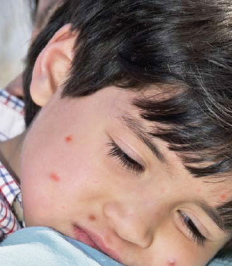Chickenpox or Varicella is a common and contagious disease of childhood, occuring most frequently among children ages 6 to 10. Chickenpox is caused by the varicella-zoster virus. Once the virus enters the body, it starts replicating in the respiratory region, which is its route of entry, and the regional lymph nodes, within 2-3 days. The virus then enters the blood stream and further replicates in the liver, spleen and other organs. Most of us develop lifetime immunity against chickenpox after the first infection. The virus will become inactive and stays in our nerve cells near the spiral cord.
Symptoms start 10 to 21 days after exposure to the virus. It begins with fever, headache, sore throat, loss of appetite and tiredness. Multiple pimple-like red bumps then pop up all over the body. Children often have milder symptoms and fewer blisters than adults. The most common complications in children are secondary infection of the lesions and scarring, with encephalitis (inflammation of the brain) being a rare complication.
Shingles
Shingles/herpes zoster is a rash of painful blisters that can last for 2 to 3 weeks. It is caused when the dormant varicella virus, which remains near the spinal cord, reactivates long after the initial chicken pox illness. About 10-20% of people who have had chickenpox develop shingles, usually occurring to those above the age of 50 years or when immunity is low. Shingles is generally not dangerous, but it can be very painful and often cause lingering nerve pain for months after the rash is gone.
Home Treatment Tips:
- Let your child have cool/lukewarm baths.
- Calamine lotion will help relieve the itchy rash.
- A prescribed antihistamine may relieve severe itch.
- Ensure your child gets adequate fluids and nutrients.
- Give foods that are cold, soft, and bland.
- Avoid acidic or salty foods.
- Give paracetomol, or acetaminophen, if your child is having fever.
- Trim your child’s fingernails. Let him wear gloves when he sleeps to prevent him from scratching. Scratching predisposes to secondary bacterial infection and causes scarring.
- Never give aspirin to reduce pain or fever in children with chickenpox.
Protect Your Family
The varicella virus is highly contagious and it spreads easily through direct contact with the infected person, through a sneeze or cough, or by touching the fluid from a chickenpox blister. It can also spread indirectly, through contact with contaminated surfaces. It is contagious 2 days before the rash appears, up to the time when all blisters have dried up.
Many children get infected through direct contact with their infected sibling. To prevent chickenpox from spreading, keep your infected child away from his siblings and get him to wash his hands frequently.
Acyclovir, an antiviral agent, is only effective when given during the early stages of infection.
Chickenpox in Pregnant Women & Newborn Babies
Chickenpox infection during early pregnancy leads to birth defects, low birth rate, or limb abnormalities in the foetus. If the mother gets infected within 10 days after delivery, her newborn baby may suffer a lifethreatening infection. An immune mother can protect her baby from infection within baby’s first few months of life, as her immunity can pass to the baby through the placenta and breast milk. Hence the importance of breastfeeding!
Varicella Vaccine
In Malaysia, the varicella vaccine has been available since 1997. It contains weakened live varicella zoster virus. The vaccine is given by subcutaneous injection. Two doses of the varicella vaccine are recommended for children with, at least a 3-month interval between the first and second booster dose.
The vaccine is reported to be more than 95% effective in preventing moderate to severe forms of the infection. In rare cases, vaccinated people can get chickenpox, but they experience a milder form of the illness, with fewer blisters and symptoms.
Recommended for:
- Healthy children between 12 months and 12 years of age.
- People above 12 years of age who have not had chickenpox.
- Non-immune family members of people with impaired immune systems.
- Non-immune women before pregnancy or after pregnancy. Those who receive the vaccine should avoid pregnancy for 2 months.
- If you are non-immune and have been around an infected person. Disease is preventable if antibodies or the vaccine is given in the initial stage.
The tetravalent MMR-V vaccine will soon be available in Malaysia. It protects against four illnesses – measles, mumps, rubella and chickenpox. This will reduce the number of shots given to your child but still giving the same amount of protection from these diseases.
Talk to your doctor if you have any questions regarding chickenpox or the varicella vaccine.







Comments